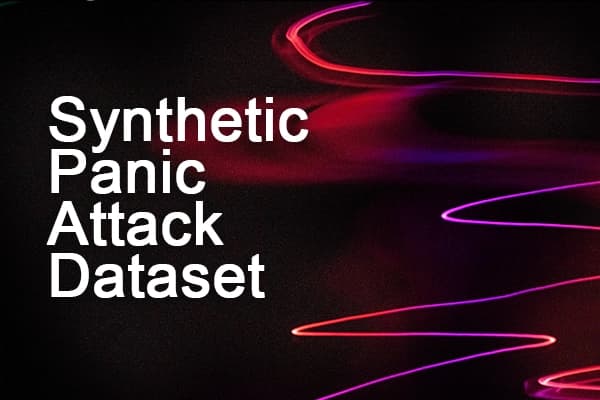Synthetic Panic Attack Dataset
Patient Health Records & Digital Health
Tags and Keywords
Trusted By




"No reviews yet"
£2.49
About
The Synthetic Panic Attack Dataset is a realistic, anonymised synthetic dataset crafted for behavioural health research, psychological modelling, and educational use. It represents a wide range of individual, lifestyle, and clinical factors associated with panic attacks.
Dataset Features
- ID: Unique identifier for each individual.
- Age: Age of the individual (in years).
- Panic_Attack_Frequency: Number of panic attacks experienced per week.
- Duration_Minutes: Average length of a panic attack episode (in minutes).
- Heart_Rate: Average heart rate recorded during a panic attack (in beats per minute).
- Caffeine_Intake: Daily caffeine intake level.
- Exercise_Frequency: Number of days the individual exercises per week.
- Sleep_Hours: Average number of hours slept per night.
- Alcohol_Consumption: Frequency or level of alcohol consumption.
- Gender: Gender identity of the individual (Female, Male, Non-binary).
- Trigger_Caffeine: Panic attacks triggered by caffeine.
- Trigger_PTSD: Panic attacks triggered by post-traumatic stress disorder.
- Trigger_Phobia: Panic attacks caused by phobic stimuli.
- Trigger_Social_Anxiety: Panic attacks related to social anxiety.
- Trigger_Stress: Panic attacks triggered by stress.
- Trigger_Unknown: No identifiable trigger reported.
- Sweating: Indicates whether sweating occurred during an attack.
- Shortness_of_Breath: Presence of breathing difficulties during an episode.
- Dizziness: Reports of dizziness or lightheadedness during the attack.
- Chest_Pain: Whether chest pain was experienced.
- Trembling: Whether the individual experienced trembling or shaking.
- Medical_History_Anxiety: History of diagnosed anxiety disorder.
- Medical_History_Depression: History of depression.
- Medical_History_PTSD: Previous diagnosis of PTSD.
- Medical_History_Missing: Medical history not disclosed or unavailable.
- Medication: Indicates whether the individual is currently on medication.
- Smoking: Whether the individual is a smoker.
- Therapy: Indicates participation in psychological therapy.
Distribution

Usage
This dataset can be used for:
- Behavioural Health Analytics: Analyse how physiological, psychological, and lifestyle variables relate to panic attack severity and frequency.
- Predictive Modelling: Develop machine learning models to predict panic attack risk or treatment outcomes.
- Intervention Strategy Development: Identify trends and triggers to guide hypothetical health interventions.
- Education: Provide students with a structured dataset to learn statistical analysis, data visualisation, and mental health modelling.
Coverage
The dataset contains thousands of detailed, synthetic records that simulate real-world mental health patterns while fully preserving individual privacy. Data reflect a range of demographics and clinical backgrounds for robust and diverse analysis.
License
CC0 (Public Domain)
Who Can Use It
- Mental Health Researchers: To explore behavioural and physiological dimensions of panic disorders.
- Data Scientists & Machine Learning Engineers: To build and test predictive models for mental health outcomes.
- Educators and Students: For teaching regression, classification, feature selection, and ethical health data practices.
- Public Health Analysts: To model population-level trends and hypothetical outcomes based on lifestyle and treatment choices.
Loading...
£2.49
Download Dataset in CSV Format
Recommended Datasets
Loading recommendations...
